 Americans leave traces of their activities, preferences and personal information in many places, both online and off. And this personal data can be fodder for both companies and the government alike. This chapter explores the public’s own experiences and attitudes about their personal data and finds that large shares are worried about the amount of information that entities, like social media companies or advertisers, have about them. At the same time, Americans feel as if they have little to no control over what information is being gathered and are not sold on the benefits that this type of data collection brings to their life.
Americans leave traces of their activities, preferences and personal information in many places, both online and off. And this personal data can be fodder for both companies and the government alike. This chapter explores the public’s own experiences and attitudes about their personal data and finds that large shares are worried about the amount of information that entities, like social media companies or advertisers, have about them. At the same time, Americans feel as if they have little to no control over what information is being gathered and are not sold on the benefits that this type of data collection brings to their life.
Most Americans are concerned about how companies are using their personal data
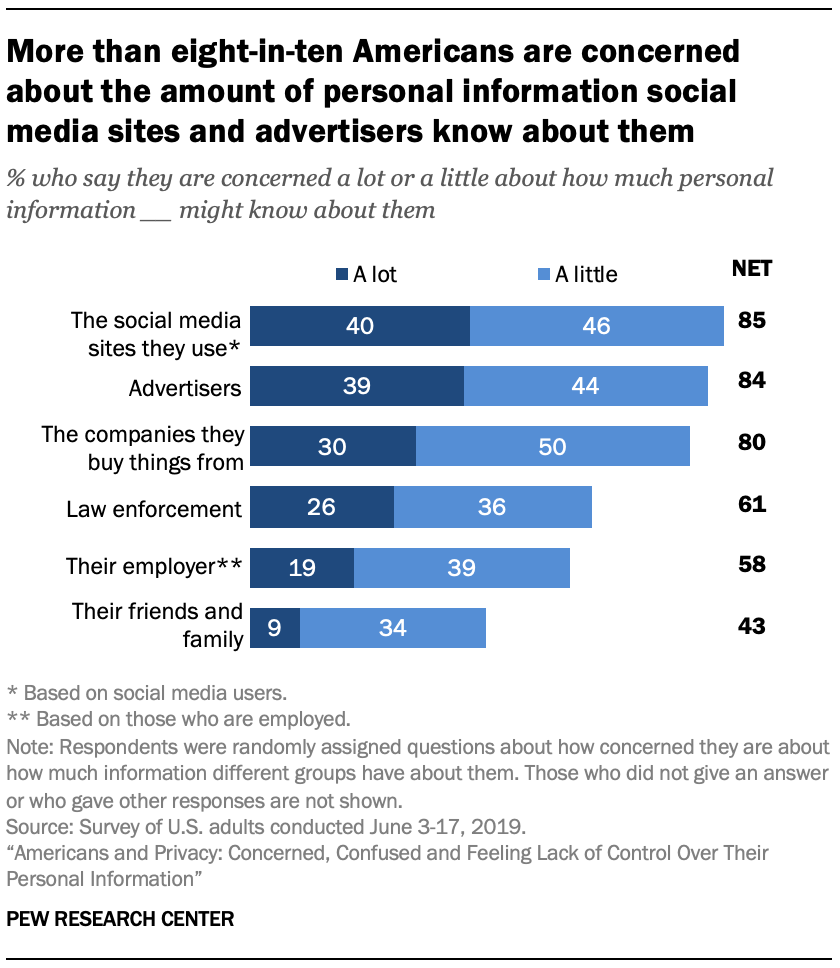 There is widespread concern among the general public about how companies – and the government – are using their personal data. Fully 79% of adults say they are at least somewhat concerned about how companies are using the data it collects about them, including 36% who say they are very concerned about this issue. At the same time, 64% of Americans report they feel very or somewhat concerned about how the government is using the data it collects about them.
There is widespread concern among the general public about how companies – and the government – are using their personal data. Fully 79% of adults say they are at least somewhat concerned about how companies are using the data it collects about them, including 36% who say they are very concerned about this issue. At the same time, 64% of Americans report they feel very or somewhat concerned about how the government is using the data it collects about them.
But even as the public has general concerns about data collection, Americans are more wary of certain groups having access to their data than others. At least eight-in-ten adults say they are at least a little concerned about how much personal information social media sites (85%), advertisers (84%), or companies they buy things from (80%) might know about them. The level of concern is felt most acutely when asked about social media sites or advertisers: About four-in-ten Americans say they have a lot of concern about how much personal information these respective groups have about them.
Smaller shares – though still a majority – of the public say they are concerned about how much information law enforcement (61%) or their employer (58%) know about them. And 43% of Americans feel this way about their friends and family.
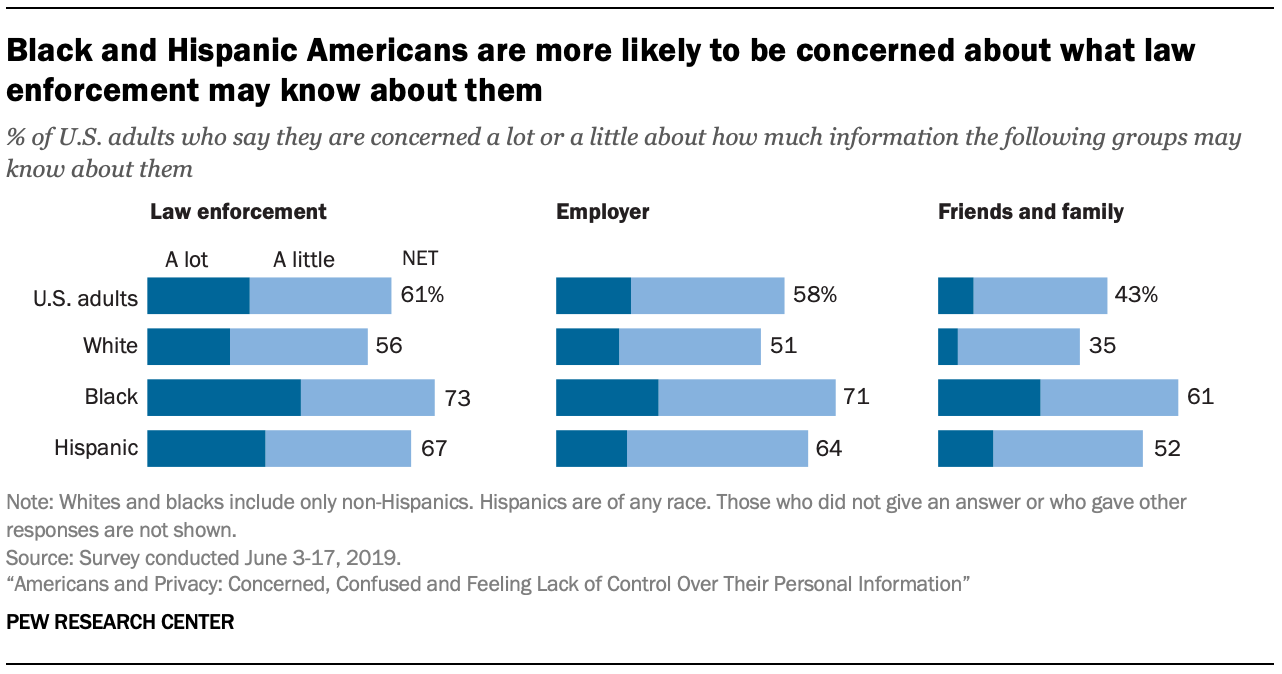
There are some worries that are prevalent among black Americans. For example, black adults are far more likely than their white counterparts to say they are at least a little concerned about the information that their friends or family (61% vs. 35%), employer (71% vs. 51%) or law enforcement (73% vs. 56%) know about them.
Relatively few Americans think they have a lot of control over their personal data
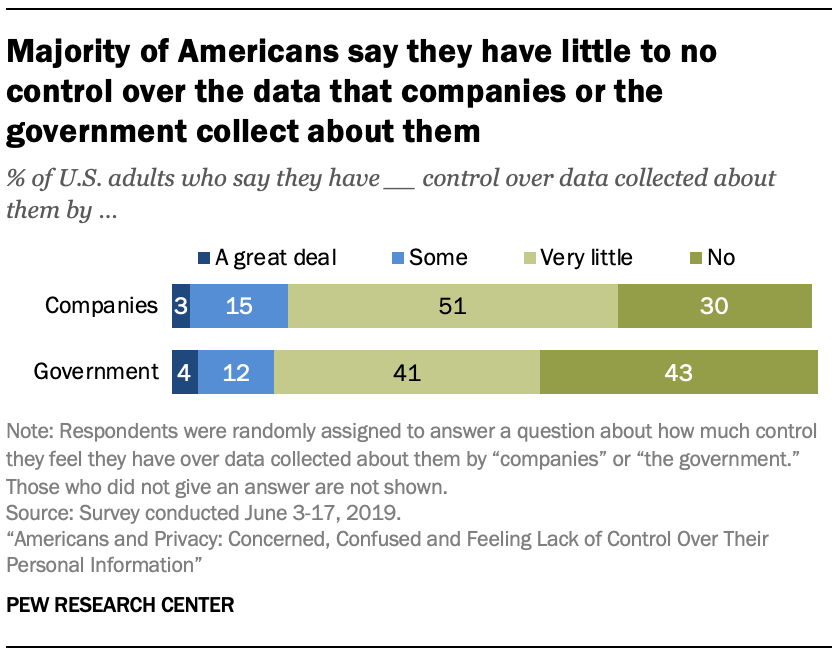 The broader conversation of data collection often centers around an individual’s ability to safeguard and manage who gets access to their personal information, as well as how certain groups use it. This survey – along with previous Center surveys – finds that relatively few Americans feel as if they are in control of the information that is gathered about them. Only 19% of adults say they have a great deal or some control over the data that companies collect about them. And 16% express similar sentiments when asked about the personal data that the government gathers. Put another way, eight-in-ten Americans say they have very little or no control over the data collected about them by the government (84%) or by companies (81%).
The broader conversation of data collection often centers around an individual’s ability to safeguard and manage who gets access to their personal information, as well as how certain groups use it. This survey – along with previous Center surveys – finds that relatively few Americans feel as if they are in control of the information that is gathered about them. Only 19% of adults say they have a great deal or some control over the data that companies collect about them. And 16% express similar sentiments when asked about the personal data that the government gathers. Put another way, eight-in-ten Americans say they have very little or no control over the data collected about them by the government (84%) or by companies (81%).
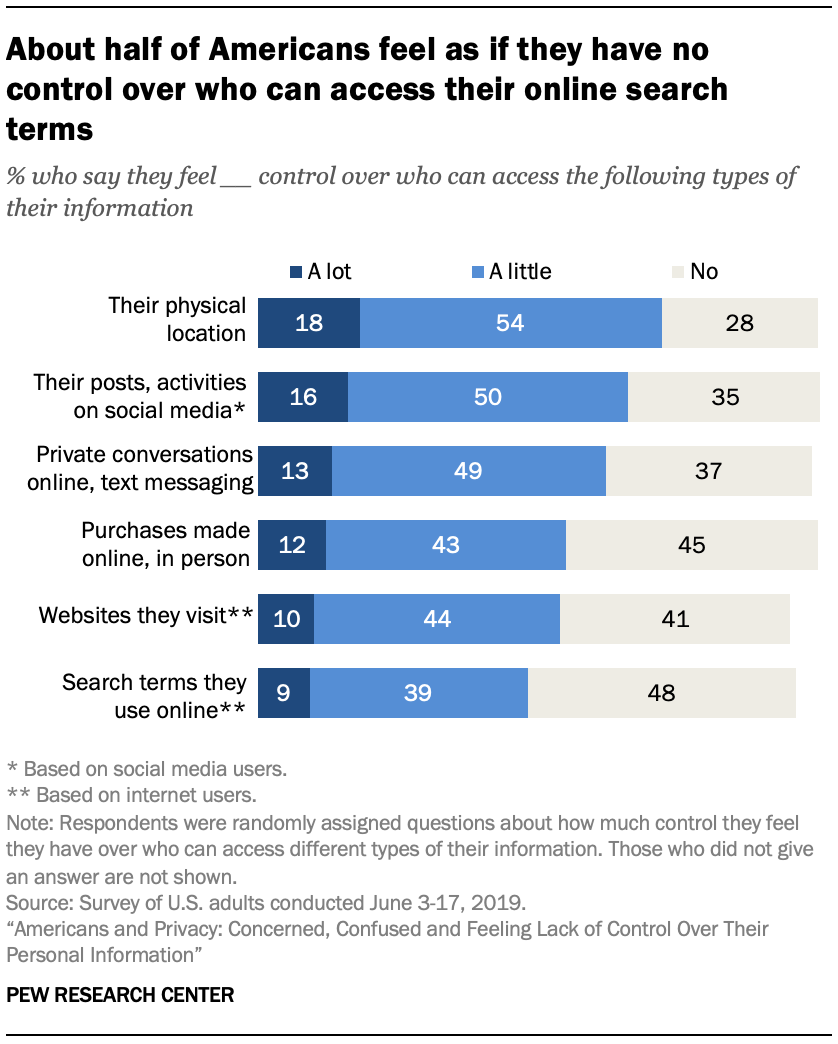 Only small shares of Americans feel as if they have a lot of control over who can access their personal information or data. Indeed, only about one-in-five or fewer believe they have a lot of control over any of the six forms of personal information measured in this survey.
Only small shares of Americans feel as if they have a lot of control over who can access their personal information or data. Indeed, only about one-in-five or fewer believe they have a lot of control over any of the six forms of personal information measured in this survey.
At the same time, there are some types of information over which notable shares feel as if they have no control. For example, roughly half of Americans (48%) say they feel they have no control over who can access their online search terms.
Older Americans feel less control across all six information types when compared with younger groups. When considering how much control they have over who has access to the websites they visit, 37% of Americans ages 65 and older say they have a lot or a little control, compared with 67% of those ages 18 to 29. Adults 65 and older are also less likely than adults under 30 to say they have control over who knows their physical location or has access to their private online or text conversations, for example.
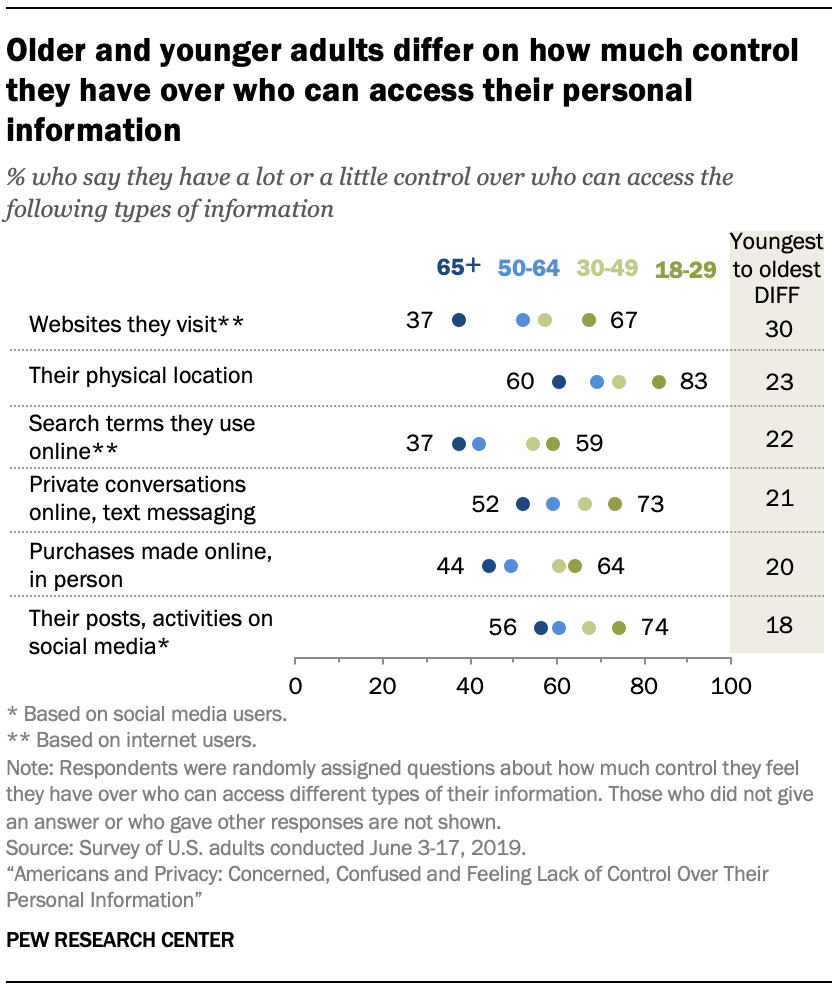 White adults also report feeling less control across all information types when compared with black and Hispanic adults. For example, only 50% of white Americans feel control over who can access information about their on- and offline purchases, compared with 69% of black adults and 66% of Hispanic adults who agree.
White adults also report feeling less control across all information types when compared with black and Hispanic adults. For example, only 50% of white Americans feel control over who can access information about their on- and offline purchases, compared with 69% of black adults and 66% of Hispanic adults who agree.
Roughly three-quarters of adults think companies are tracking all or most of what they do online or on their cellphone
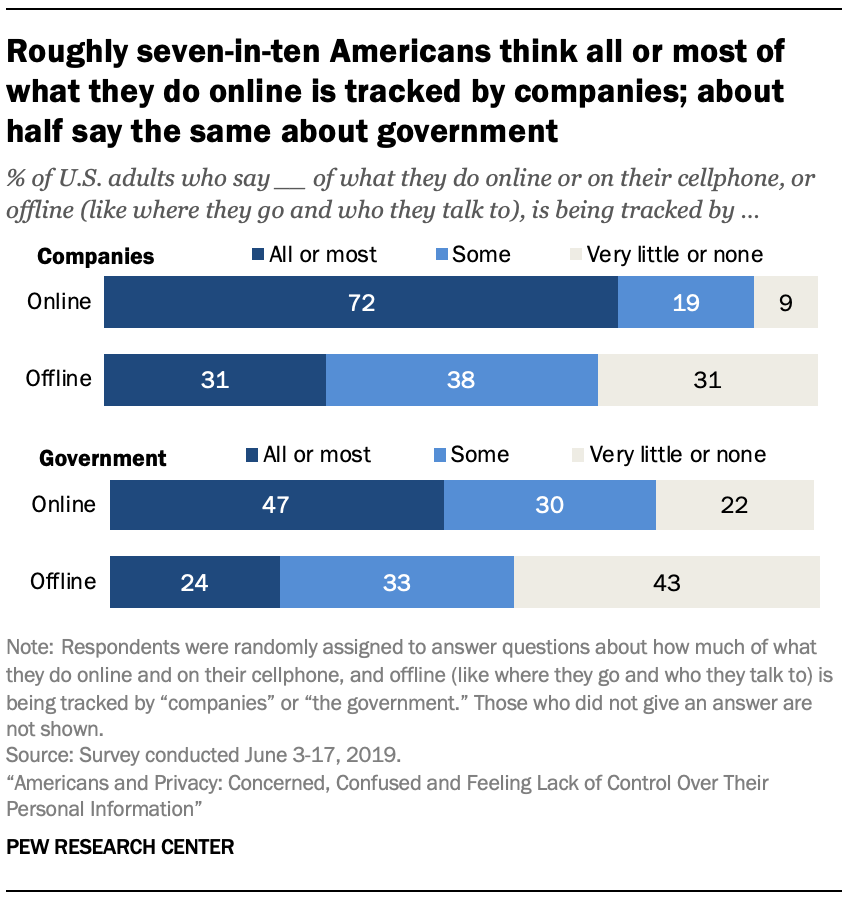 A majority of Americans (72%) believe all or most of what they do online or on their cellphone is being tracked by companies, but far fewer (31%) think all or most of their offline activities, like where they go or who they talk to, are being tracked by the same entities. Americans are less likely to think the government is tracking them, both online and off: 47% believe all or most of their online and cellphone activities are being tracked, but only around a quarter (24%) of adults think the same of their offline activities.
A majority of Americans (72%) believe all or most of what they do online or on their cellphone is being tracked by companies, but far fewer (31%) think all or most of their offline activities, like where they go or who they talk to, are being tracked by the same entities. Americans are less likely to think the government is tracking them, both online and off: 47% believe all or most of their online and cellphone activities are being tracked, but only around a quarter (24%) of adults think the same of their offline activities.
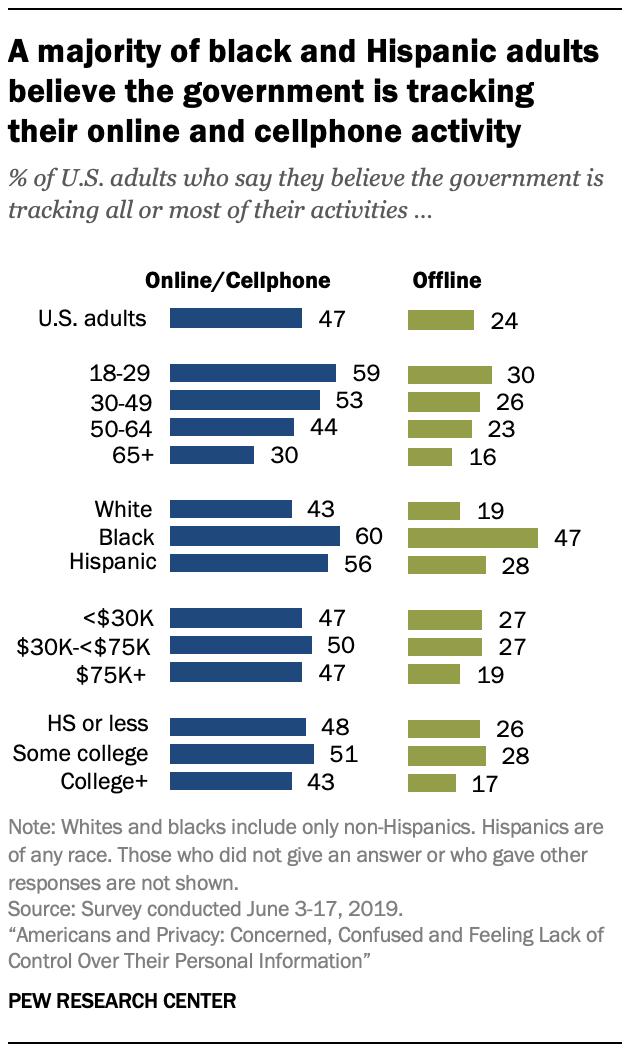
When it comes to Americans’ beliefs about whether the government is tracking them, there are differences by race and ethnicity, as well as by age.
For example, black Americans are more likely than white Americans to say they believe the government is tracking all or most of what they do online or on their cellphone (60% vs. 43%). Similar gaps are present in views about offline activities: 47% of black adults think their offline activities are tracked by the government, compared with 19% of white adults.
Younger adults are also more likely than older adults to believe they are being tracked, online and off, by the government. Around 60% of those ages 18 to 29 believe their online and cellphone activities are being tracked, compared with a smaller share (30%) of those 65 and older. A similar gap exists for offline activities: While 30% of those 18 to 29 think offline activities are being tracked by the government, only 16% of those 65 and older agree. These numbers increase significantly, but follow a similar pattern, when online and offline tracking by companies is considered.
Relatively small shares of the public say they understand what is being done with the data collected about them
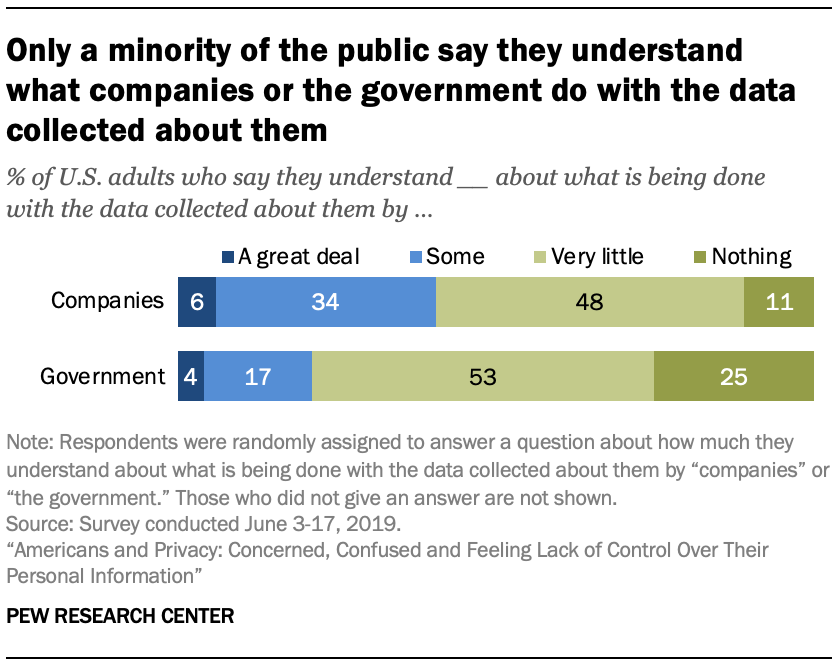 Though many Americans feel their activities are being tracked, online and off, by both companies and the government, very few believe they understand what these entities are doing with the data being collected. Only 6% of adults say they understand a great deal what companies do with the data collected, and a similar share (4%) say they know a great deal about what the government does with the data. In contrast, 78% say they understand very little or nothing about what is being done with their data by the government, and 59% say this about the things companies do.
Though many Americans feel their activities are being tracked, online and off, by both companies and the government, very few believe they understand what these entities are doing with the data being collected. Only 6% of adults say they understand a great deal what companies do with the data collected, and a similar share (4%) say they know a great deal about what the government does with the data. In contrast, 78% say they understand very little or nothing about what is being done with their data by the government, and 59% say this about the things companies do.
There are moderate differences in understanding by educational attainment. Those with some college experience are more likely to say they understand what is being done with the data collected about them by both the government and companies. While 46% of those with some college education say they understand at least some about what is being done with the data collected about them by companies, just 38% of those with a college degree or higher and 37% of those with a high school education or less agree. A similar trend follows for understanding of data the government collects.
Roughly 80% of Americans think the risks of companies collecting data about them outweigh the benefits
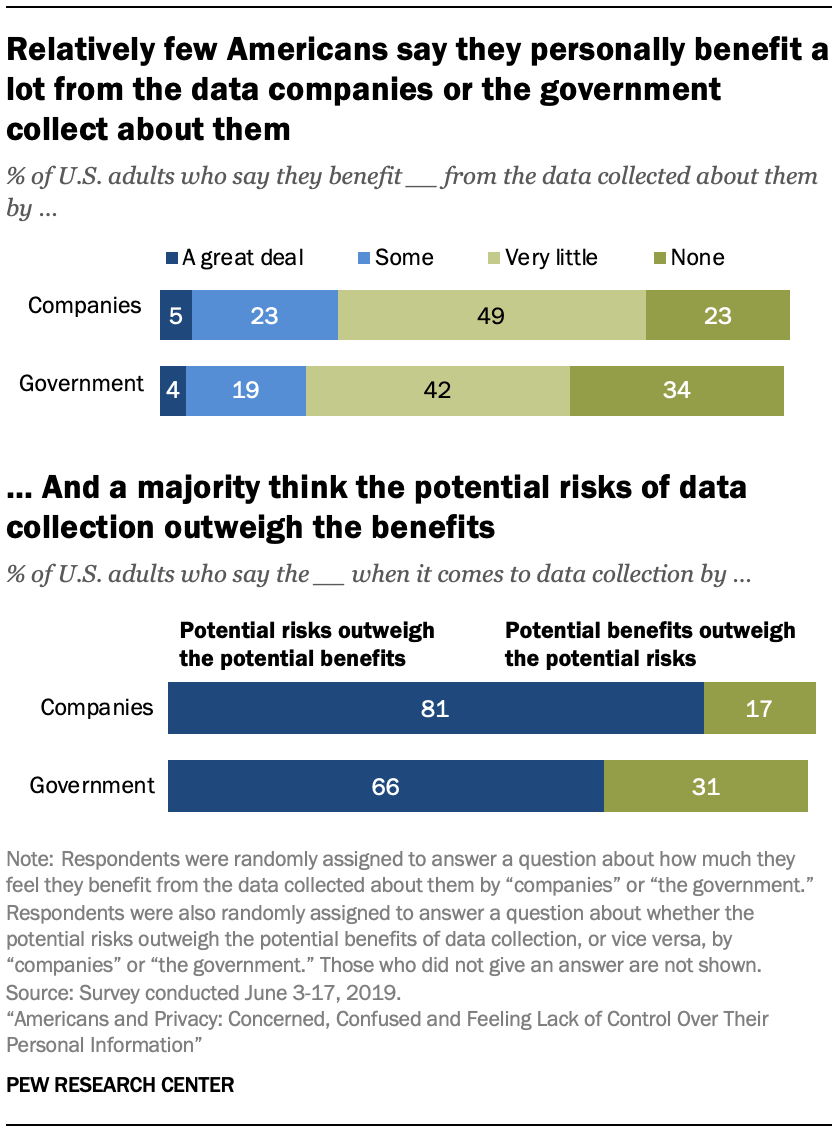 Significant shares of Americans are not convinced they benefit from this level of tracking and data collection. Roughly three-quarters of adults say they benefit very little or none from the data that companies (72%) or the government (76%) collect about them. On the other hand, about three-in-ten Americans (28%) say they get a great deal or some personal benefit from companies’ collecting data, and 23% say the same about the government’s efforts.
Significant shares of Americans are not convinced they benefit from this level of tracking and data collection. Roughly three-quarters of adults say they benefit very little or none from the data that companies (72%) or the government (76%) collect about them. On the other hand, about three-in-ten Americans (28%) say they get a great deal or some personal benefit from companies’ collecting data, and 23% say the same about the government’s efforts.
When asked which of the following statements best described how they feel, 81% of of adults say that the “potential risks of companies collecting data about them outweigh the benefits,” and just 17% say the benefits they get from companies outweigh the risks.
A similar pattern is seen when asked about the government. Two-thirds of Americans say the potential risks from data collection outweigh the benefits, while about one-third (31%) say the benefits outweigh the risks.
 White Americans are less likely to feel they benefit from the collection of data. Only 19% of white adults say they benefit from data collected by the government, and 23% say they benefit from company-collected data. Slightly larger shares of black and Hispanic Americans find more benefit in both: 32% of black adults and 29% of Hispanic adults find data collected by the government beneficial, and 38% of black adults and 39% of Hispanic adults find benefit in company-collected data.
White Americans are less likely to feel they benefit from the collection of data. Only 19% of white adults say they benefit from data collected by the government, and 23% say they benefit from company-collected data. Slightly larger shares of black and Hispanic Americans find more benefit in both: 32% of black adults and 29% of Hispanic adults find data collected by the government beneficial, and 38% of black adults and 39% of Hispanic adults find benefit in company-collected data.
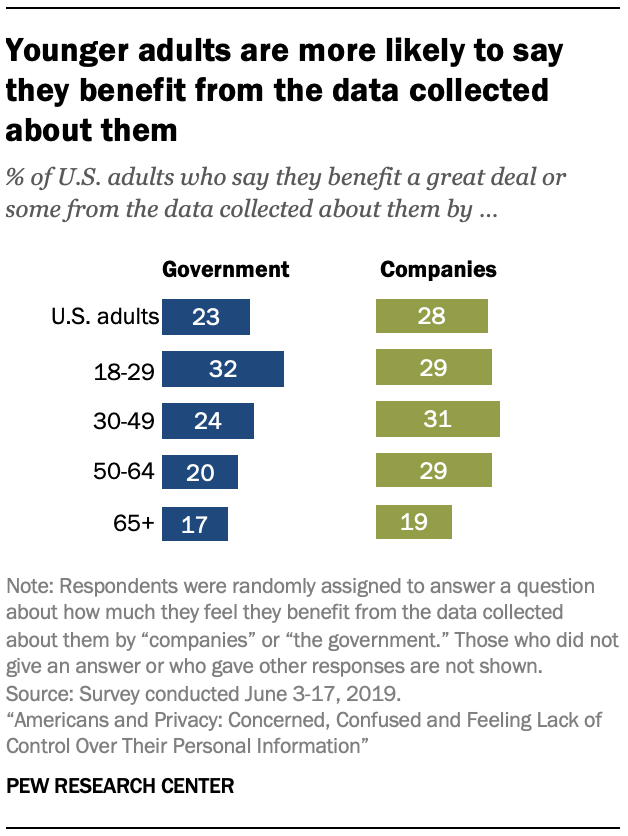 Older Americans also feel they benefit very little from government and corporate collection of data, with just 17% of those 65 and older believing they benefit from the data government collects about them and only 19% thinking the same about data collected by companies.
Older Americans also feel they benefit very little from government and corporate collection of data, with just 17% of those 65 and older believing they benefit from the data government collects about them and only 19% thinking the same about data collected by companies.
About six-in-ten Americans do not think it is possible to go about daily life without having companies or government collect personal data
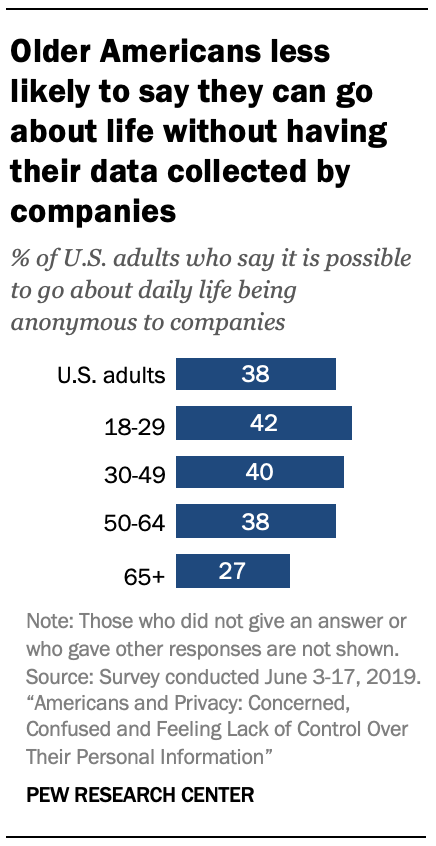 A majority of adults (62%) say they do not think it is possible to go through daily life without having their data collected by companies, and 63% think the same about government data collection. Still, 38% of Americans think it is possible to go about daily life without having their data collected by companies, and 36% say the same about having their data collected by the government.
A majority of adults (62%) say they do not think it is possible to go through daily life without having their data collected by companies, and 63% think the same about government data collection. Still, 38% of Americans think it is possible to go about daily life without having their data collected by companies, and 36% say the same about having their data collected by the government.
There are some differences by age, with older adults being more skeptical than their younger counterparts about the possibility of anonymity. While 27% of adults ages 65 and older say it is possible to go about daily life and remain anonymous to companies, that share rises to around 40% among adults under the age of 65.
When considering the idea of anonymity from the government, only 33% of adults in both older demographics (50 to 64 and 65 and older) believe it’s possible, compared with a larger share (41%) of those 30 to 49.


